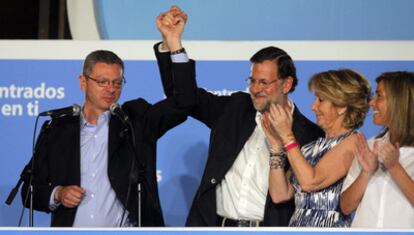Rajoy on cusp of ending seven-year wait for top job
Opposition leader maintains his quiet-man strategy despite resounding gains
Even for such a quiet, patient man as Mariano Rajoy, seven years is a long time to wait. Yet that is how much time has elapsed since the conservative débâcle of March 14, 2004, when the Socialists unexpectedly rose to power denying him, José María Aznar's designated successor, the prime minister's office. But now, when a night of utter euphoria did come, it was in an overwhelming way.
Popular Party (PP) leader Rajoy has beaten all of his party's own records and obtained the greatest possible endorsement of his low-key strategy aimed at not ruffling the left-wing voters into action. All he needs to do now is to hold on a little longer until next spring's general elections to finally reach his dream of moving into La Moncloa on the third attempt.
Since Sunday night, the PP enjoys the kind of hegemony at the regional level that had not been seen in Spain since the Socialist juggernaut of the 1980s. And in a quasi-federal country like Spain, much of the power lies in the regions. The conservatives now rule all the "autonomous communities" save Andalusia (which, all things considered, is likely to revert to them when it holds regional elections next year), the Basque Country and Catalonia (neither of which held regional polls on Sunday, either), Navarre and Asturias (where it might partner with another party to govern).
Rajoy's party was endorsed by 37.58 percent of voters, representing nearly two percentage points and 400,000 more votes than in 2007. The PP also has 4,500 more councilors than the PSOE in city halls across the country. It was the most-voted party in all regions that were holding elections save Navarre (due to its dispute with local conservative faction UPN).
The road is clear, then, for the PP to extend its dominion over most of the country.
From this position of power, the conservatives can now apply more pressure to obtain what they've been wanting all along: early general elections that would surely favor the PP on the back of widespread discontent over the government's handling of the ongoing economic crisis.
Still, even now Rajoy has shown reluctance to push further, as if fearing a false move when so close to the objective. On Sunday night, when he came out on the balcony at party headquarters to greet the crowd outside, he merely thanked his constituency and noted that "this has been the best result in the history of the Popular Party." While supporters cried "Zapatero, resign!" the PP leader simply thanked the voters who cast their ballots for the PP for the first time, saying "They will not regret it."
In fact, despite the scope of Sunday's victory, nobody on Génova street wants to discuss the possibility of an absolute majority next March, among other things to prevent this idea from mobilizing left-wing voters into action. Yet at this point, many leaders are considering this scenario more than likely.
The results went even beyond the PP's wildest dreams. Conservatives were seeking a historic triumph in the vein of its 1995 regional win, which paved the way for its victory in general elections the following year. But instead of a five-point advantage, this time the PP has managed an unprecedented 10-point lead over the PSOE nationwide.
If voter sentiment remains the same, Rajoy is sure to be sitting in La Moncloa this time next year. But he does not seem in a hurry to do so- after seven years, he can wait a few more months.

Tu suscripción se está usando en otro dispositivo
¿Quieres añadir otro usuario a tu suscripción?
Si continúas leyendo en este dispositivo, no se podrá leer en el otro.
FlechaTu suscripción se está usando en otro dispositivo y solo puedes acceder a EL PAÍS desde un dispositivo a la vez.
Si quieres compartir tu cuenta, cambia tu suscripción a la modalidad Premium, así podrás añadir otro usuario. Cada uno accederá con su propia cuenta de email, lo que os permitirá personalizar vuestra experiencia en EL PAÍS.
¿Tienes una suscripción de empresa? Accede aquí para contratar más cuentas.
En el caso de no saber quién está usando tu cuenta, te recomendamos cambiar tu contraseña aquí.
Si decides continuar compartiendo tu cuenta, este mensaje se mostrará en tu dispositivo y en el de la otra persona que está usando tu cuenta de forma indefinida, afectando a tu experiencia de lectura. Puedes consultar aquí los términos y condiciones de la suscripción digital.








































